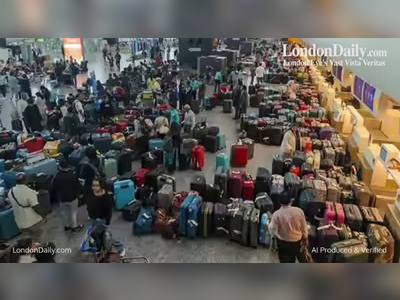UK Asylum Housing Firm Faces Backlash Over £187 Million Profits and Poor Living Conditions
Clearsprings Ready Homes accused of exploiting taxpayer contracts as asylum seekers report unsafe, unhygienic and degrading accommodation
Clearsprings Ready Homes, a private company contracted by the UK Home Office to manage asylum accommodation, has made £187 million in profits since 2019, despite mounting allegations of neglect and poor conditions in the hotels it operates.
Residents and charities have described the facilities as unsafe, unhygienic and degrading, while lawmakers demand greater scrutiny of the multibillion-pound contracts.
The company is one of three main providers tasked with housing asylum seekers across Britain and currently accommodates around 30,000 people across southern England, Wales and London.
About half live in hotels run by subcontractors.
Official figures show the total value of asylum accommodation contracts has tripled—from £4.5 billion to around £15 billion—since they were first awarded, with Clearsprings expected to receive over £7 billion during the term of its deal, which runs until 2029.
Public filings reveal that since 2019, Clearsprings has paid £183 million in dividends to its parent company—nearly matching its profits.
Combined with the two other providers operating nationwide, the firms have collectively earned £383 million from Home Office asylum housing contracts.
Clearsprings’ founder, Graham King, now listed on the Sunday Times Rich List with an estimated net worth of more than £1 billion, remains the sole shareholder of the parent company.
Residents inside Clearsprings-managed hotels describe severe overcrowding, dirty rooms, and meagre food portions.
Many claim they receive expired or uncooked meals with little nutritional value.
One mother said she resorted to boiling eggs in a kettle to provide protein for her daughter.
Others report being limited to one toilet roll per week and having to seek additional food and hygiene products from local foodbanks.
Charities and paediatric health experts warn that such conditions would be classified as neglect in any domestic setting.
Clearsprings has acknowledged that temporary hotel accommodation yields higher profit margins than longer-term housing, a structure MPs say encourages prolonged hotel stays over sustainable relocation.
The firm told a parliamentary committee it had set aside £32 million to return to the Home Office after reporting average margins of 6.9 %, exceeding the agreed 5 % profit threshold.
However, the government has yet to confirm whether any repayments have been received.
Further controversy surrounds payments totalling £17 million made to a Dubai-based consultancy, Bespoke Strategy Solutions Ltd, owned by Mr King.
Clearsprings described the payments as legitimate consultancy fees, but tax experts have called the offshore structure “highly unusual” and urged greater transparency.
Lawmakers have urged ministers to use a 2026 break clause to renegotiate or terminate existing contracts, describing the arrangements as poor value for money.
The Home Office said an audit is under way into the performance and profits of suppliers and confirmed that five contractors will return excess profits to the government.
Despite the growing corporate revenues, thousands of asylum seekers remain trapped in overcrowded and unsanitary hotels—unable to work, raise families safely, or move forward with their asylum claims.
For many, life in the system remains defined by uncertainty, indignity and prolonged hardship.
Residents and charities have described the facilities as unsafe, unhygienic and degrading, while lawmakers demand greater scrutiny of the multibillion-pound contracts.
The company is one of three main providers tasked with housing asylum seekers across Britain and currently accommodates around 30,000 people across southern England, Wales and London.
About half live in hotels run by subcontractors.
Official figures show the total value of asylum accommodation contracts has tripled—from £4.5 billion to around £15 billion—since they were first awarded, with Clearsprings expected to receive over £7 billion during the term of its deal, which runs until 2029.
Public filings reveal that since 2019, Clearsprings has paid £183 million in dividends to its parent company—nearly matching its profits.
Combined with the two other providers operating nationwide, the firms have collectively earned £383 million from Home Office asylum housing contracts.
Clearsprings’ founder, Graham King, now listed on the Sunday Times Rich List with an estimated net worth of more than £1 billion, remains the sole shareholder of the parent company.
Residents inside Clearsprings-managed hotels describe severe overcrowding, dirty rooms, and meagre food portions.
Many claim they receive expired or uncooked meals with little nutritional value.
One mother said she resorted to boiling eggs in a kettle to provide protein for her daughter.
Others report being limited to one toilet roll per week and having to seek additional food and hygiene products from local foodbanks.
Charities and paediatric health experts warn that such conditions would be classified as neglect in any domestic setting.
Clearsprings has acknowledged that temporary hotel accommodation yields higher profit margins than longer-term housing, a structure MPs say encourages prolonged hotel stays over sustainable relocation.
The firm told a parliamentary committee it had set aside £32 million to return to the Home Office after reporting average margins of 6.9 %, exceeding the agreed 5 % profit threshold.
However, the government has yet to confirm whether any repayments have been received.
Further controversy surrounds payments totalling £17 million made to a Dubai-based consultancy, Bespoke Strategy Solutions Ltd, owned by Mr King.
Clearsprings described the payments as legitimate consultancy fees, but tax experts have called the offshore structure “highly unusual” and urged greater transparency.
Lawmakers have urged ministers to use a 2026 break clause to renegotiate or terminate existing contracts, describing the arrangements as poor value for money.
The Home Office said an audit is under way into the performance and profits of suppliers and confirmed that five contractors will return excess profits to the government.
Despite the growing corporate revenues, thousands of asylum seekers remain trapped in overcrowded and unsanitary hotels—unable to work, raise families safely, or move forward with their asylum claims.
For many, life in the system remains defined by uncertainty, indignity and prolonged hardship.









